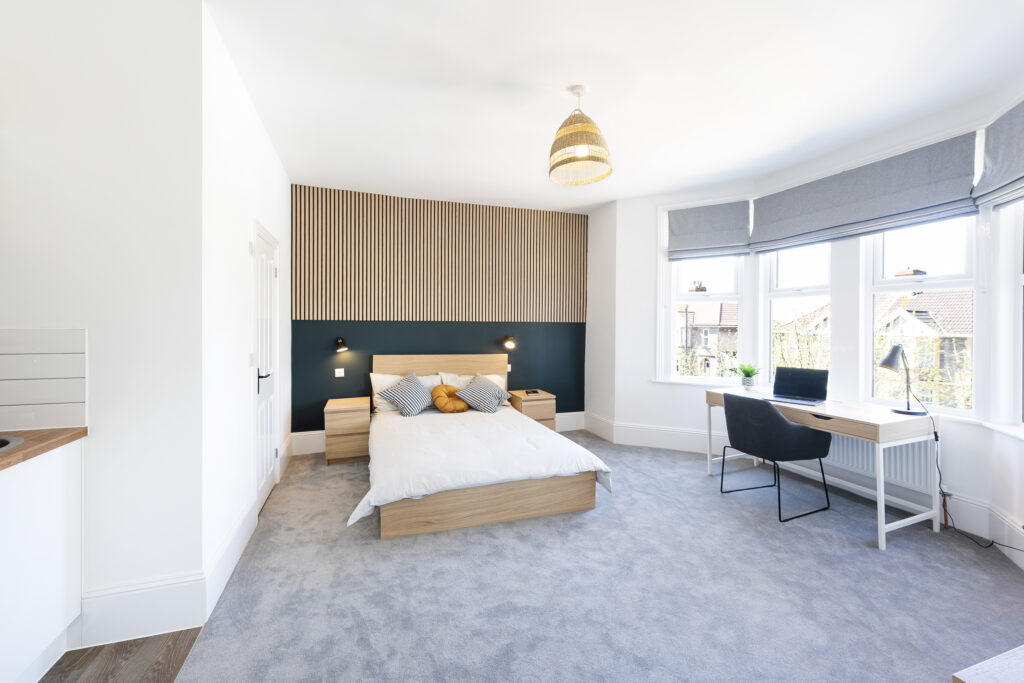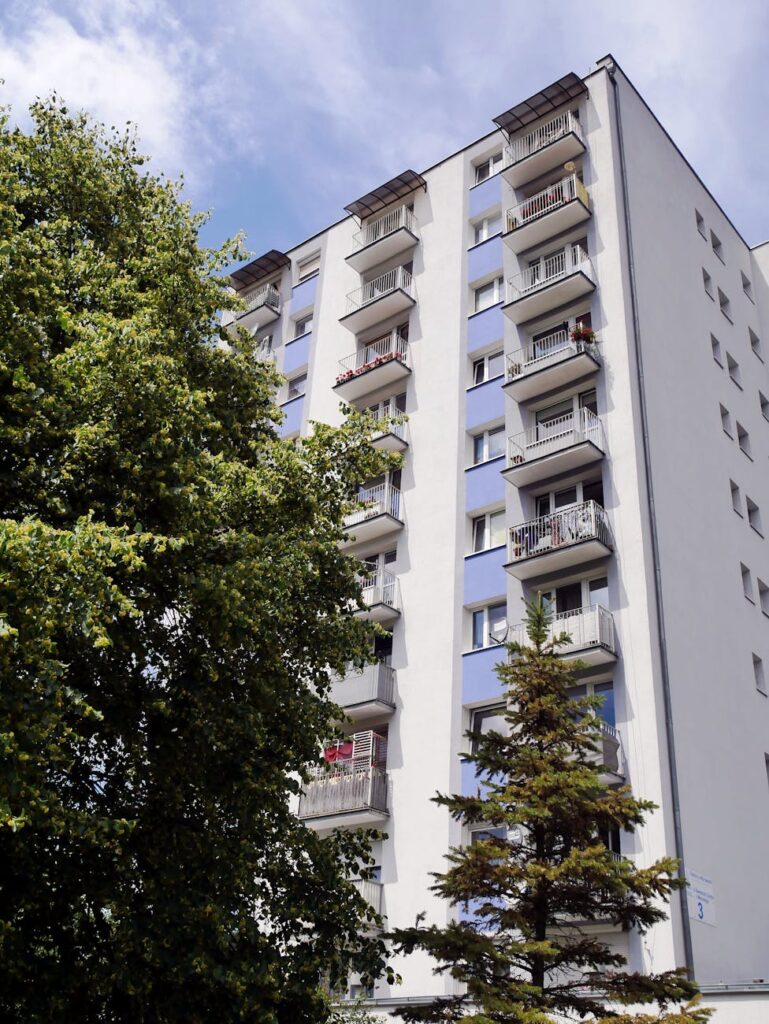Whether you’re new to Bristol or a long-term resident, finding the right place to rent can feel overwhelming, with so many rental options in Bristol available, it’s important you know the options and differences. As Bristol letting agents we have a variety of property types available, from shared accommodation to renting an entire flat or house, understanding your options is key to finding a home that suits your lifestyle and budget. In this guide, we’ll break down the different types of properties you can rent in Bristol, the pros and cons of each, and what you need to know about your rights as a tenant.

1. Renting a Room in Shared Accommodation as a Lodger
One of the more affordable rental options in Bristol is becoming a lodger. In this setup, you rent a room in a house where the landlord also lives. This type of rental can be ideal for people looking for a more cost-effective solution or a short-term stay. You’ll find these on Spareroom.com.
What’s Involved in Being a Lodger?
As a lodger, you typically rent a room in a landlord’s home and share common areas such as the kitchen and bathroom. You’ll often have a more informal arrangement with your landlord compared to other rental agreements. This can leave you more vulnerable to eviction and you have less protection as you won’t be on a AST (Assured Shorthold Tenancy).
Finding a Room as a Lodger: Websites like Spareroom, local Facebook groups, and word of mouth are good places to find lodger opportunities. Often, landlords advertise directly without involving letting agents, so you might find more flexibility in pricing and conditions.
Legal Differences for Lodgers:
License Agreement, Not a Tenancy: When you’re a lodger, you usually don’t have an Assured Shorthold Tenancy (AST). Instead, you have a license to occupy, which offers less protection than an AST. Your landlord can give you shorter notice to leave, and your rights are more limited because the landlord also lives in the property.
Less Security: Unlike tenants with an AST, lodgers have fewer rights when it comes to eviction. If the relationship with your landlord breaks down, they only need to give you ‘reasonable notice’ (which could be as short as a week) to vacate.
Pros:
- Cheaper than renting a whole flat or HMO room.
- Bills are often included, making it easier to budget.
- Typically more flexible agreements, ideal for short-term renters.
- There are lots of property owners looking for lodgers as they help to offset their bills.
Cons:
- Fewer legal protections.
- You’re living with the landlord, so privacy might be limited.
2. Renting a Room in an HMO (House in Multiple Occupation)
For those looking to rent a room without living with the landlord, HMOs (Houses in Multiple Occupation) or bedsits are a popular option. These properties are shared by multiple tenants who each rent a room but share communal spaces like kitchens and bathrooms. For this, use letting agents in Bristol to find a suitable property.

How Does a HMO Work?
HMOs are common in student-heavy cities like Bristol. They tend to offer more freedom than being a lodger, as you have your own space within the house, and you’re renting from a landlord who doesn’t live in the property.
Where to Find HMOs: Letting agents and property websites like Rightmove, Zoopla, and OpenRent are great places to start. You’ll also find listings for rooms in HMOs on Spareroom and local Facebook groups.
Legal Protections for HMO Tenants:
Assured Shorthold Tenancy (AST): Most HMO tenants will have an AST, giving them stronger legal protections compared to lodgers. This includes a formal notice period for eviction, the requirement for the landlord to protect your deposit in a government-approved scheme, and clearly outlined responsibilities regarding repairs and maintenance.
Council Inspections: HMOs must meet specific safety standards and are often inspected by the local council to ensure compliance. They’ll also need to have a license in certain areas of Bristol, so the standard of the property needs to be of a certain level. This means HMO properties must have up-to-date fire safety measures, such as smoke alarms and fire doors.
Pros:
- You have your own space, often with more independence.
- Legal protections are stronger with an AST, you can be given 2 months notice rather unlike a lodger agreement where you can be as little as a week.
- Usually more affordable than renting an entire flat or house.
- Bills are often included, making budgeting easier and is more cost effective than renting a whole house.
Cons:
- You share common spaces, which can lead to conflicts over cleanliness or noise. You’ll share a kitchen and depending on the house bathrooms – but HMO’s with en-suites are becoming more common in Bristol and developers look to build better quality accommodation.
- Larger HMOs can sometimes feel crowded, depending on the number of tenants, but there are rules on this that landlords have to follow.
3. Renting a Whole Flat or House
Renting an entire flat or house is a great option for those who want more privacy and space. This option suits individuals, couples, or families looking for a self-contained property where they don’t have to share with others.
What’s Involved in Renting a Whole Property?
When you rent an entire flat or house, you’re typically the sole tenant (or one of a couple), meaning you have control over the entire property. This provides more privacy and freedom but also comes with higher costs and responsibilities.
Where to Find Flats and Houses: Properties are often listed through letting agents and on property websites like Rightmove, Zoopla, and OpenRent. In Bristol’s competitive market, it’s important to act quickly when you find a suitable place. Register with letting agents to let them know what you’re looking for and they’ll often email you or update you about potential properties before they go online.

Legal Protections for Tenants Renting a Whole Property:
Assured Shorthold Tenancy (AST): Like HMO tenants, those renting an entire property will typically have an AST, which offers legal protection. Your deposit will need to be protected, and you are entitled to a formal notice period if the landlord wants to end the tenancy.
Responsibility for Utilities: As the sole tenant, you’ll be responsible for setting up and paying utility bills like gas, electricity, and water, unless otherwise stated in the tenancy agreement.
Pros:
- Full privacy and control over the property.
- Strong legal protections under an AST.
- Ideal for couples, families, or those seeking more space.
Cons:
- More expensive than shared accommodation.
- All utility bills are your responsibility, which can add up.
Other Types of Rental Housing in Bristol: While shared accommodation, HMOs, and private rentals are the most common options, there are other types of housing that you may be eligible for, depending on your situation.
Council Housing
Council housing provides affordable rental accommodation to those who qualify based on need. Bristol City Council manages its own housing stock and works with housing associations to provide social housing.
How to Apply: You’ll need to join the HomeChoice Bristol waiting list, which prioritizes those with the greatest housing needs.
Legal Protections: Tenants in council housing typically have secure tenancies, which offer long-term protection and more rights than private renters.
Housing Associations
Housing associations operate similarly to council housing, providing affordable homes to rent for people in need. They are often non-profit organizations and work closely with the local council.
How to Apply: Many housing associations also use the HomeChoice Bristol scheme, so you can apply through the same system. Each housing association has its own rules for eligibility and rent pricing.
Tenancy Types: Tenants may have assured tenancies, offering long-term security and protection from eviction without a valid reason.
Sheltered Housing
For older people or those with specific support needs, sheltered housing provides a self-contained home with added communal facilities and support staff on-site.
Who Is It For? Sheltered housing is typically designed for older individuals who are looking for independent living but want the security of a warden or support staff nearby.
How to Apply: You can apply through the local council or housing associations that offer these services.
Student Housing
For students, options range from university-run accommodation to private rental properties, including HMOs and purpose-built student accommodation.
University-Managed Halls: Typically for first-year students, these halls offer a shared living environment with other students and are usually located close to campus.
Private Student Accommodation: There are also privately-run student halls and HMOs that cater specifically to students. Websites like Unilodgers and Student.com specialize in student housing options.
Things to Have Prepared Before Applying for a Property
Before you start applying for rental properties in Bristol, it’s important to have all the necessary documents and information ready to speed up the process. Landlords and letting agents often ask for certain paperwork to assess your suitability as a tenant, and having everything prepared can give you a competitive edge in a busy rental market. Here’s a checklist of what you’ll need:
1. Proof of Income
Landlords want to ensure that you can afford the rent, so you’ll need to provide proof of your income.
Recent Payslips: Most landlords will ask for your last 3 months’ payslips as proof of employment and income stability.
Employment Contract or Offer Letter: If you’ve just started a new job or are about to, providing an employment contract or a letter from your employer confirming your salary can help.
Bank Statements: You may also be asked to provide recent bank statements to show your income and outgoings, confirming that you can comfortably afford the rent.
2. Guarantor (If Needed)
If you’re a student, self-employed, or don’t meet the affordability requirements (usually around 2.5-3x the monthly rent in annual income), you may need a guarantor.
Guarantor’s Information: A guarantor is someone who agrees to cover your rent if you’re unable to pay. They will need to provide proof of income, identity, and often sign a guarantor agreement. Typically, guarantors are required to earn more than 3x the rent or have sufficient savings.
3. Proof of Identity
Landlords need to verify your identity, so you’ll need to provide:
Passport or Driving License: A valid photo ID is required to confirm your identity. If you’re applying for a property as a non-UK resident, your passport is essential.
Visa or Right to Rent Documents: If you’re a non-UK citizen, you’ll need to provide proof of your legal right to live and rent in the UK. This could be a visa, residence permit, or settled status documentation.
4. References
Most landlords or letting agents will want references to confirm that you’ve been a reliable tenant in the past.
Previous Landlord Reference: If you’ve rented before, you’ll need a reference from your previous landlord confirming that you paid rent on time and maintained the property well.
Employer Reference: Some landlords ask for an employer reference to confirm your employment status and income. This should come from your HR department or direct manager and confirm your job stability.
5. Deposit and Holding Fee
Renting a property often requires upfront costs, so it’s important to have the following funds ready:
Holding Deposit: When you express interest in a property, you may need to pay a holding deposit (usually 1 week’s rent) to take the property off the market. If the application is successful, this amount is usually deducted from your first month’s rent.
Security Deposit: You’ll also need to provide a security deposit, typically equal to 5 weeks’ rent. This deposit is held by the landlord or agent and protected in a government-approved deposit protection scheme such as DPS or TDS.
6. Credit History
Many landlords and letting agents will run a credit check to assess your financial reliability.
Good Credit Score: If you have outstanding debts or missed payments on your credit file, this could impact your application. Make sure your credit score is in good shape by checking it ahead of time through free services like Experian or ClearScore.
Proof of Address: Sometimes you’ll be asked for additional documents to confirm your current address, such as a utility bill or bank statement from the last 3 months.
7. Right to Rent Checks
Under UK law, landlords must confirm that you have the legal right to rent in the UK. This applies to both UK and non-UK residents.
Right to Rent Documentation: For UK citizens, your passport or driving license is usually enough. Non-UK citizens will need to provide additional documents, such as visas or residence permits. If you’re unsure, you can use the UK government’s Right to Rent online checking service.
8. Application Form Details
When applying for a property, you’ll often be asked to complete a tenant application form. Make sure you have the following details ready:
Personal Information: Full name, date of birth, and contact details.
Rental History: Details of your previous rental properties and landlord contact information.
Employment Information: Job title, salary, and length of employment.
Emergency Contact Information: You may also be asked for an emergency contact.
You can register with Front Door Lettings here.

Why choose Bristol?
Bristol offers a wide range of rental options, from being a lodger in shared accommodation to renting a whole flat or house. Each option comes with its own benefits and challenges, and understanding the differences in legal protections, costs, and living arrangements is crucial when deciding where to live.
Whether you’re looking for the flexibility of shared accommodation or the independence of renting your own place, taking the time to research the right type of property for you is key. And with Bristol’s competitive rental market, knowing where to find properties and understanding your rights as a tenant can make the process smoother and more successful.

